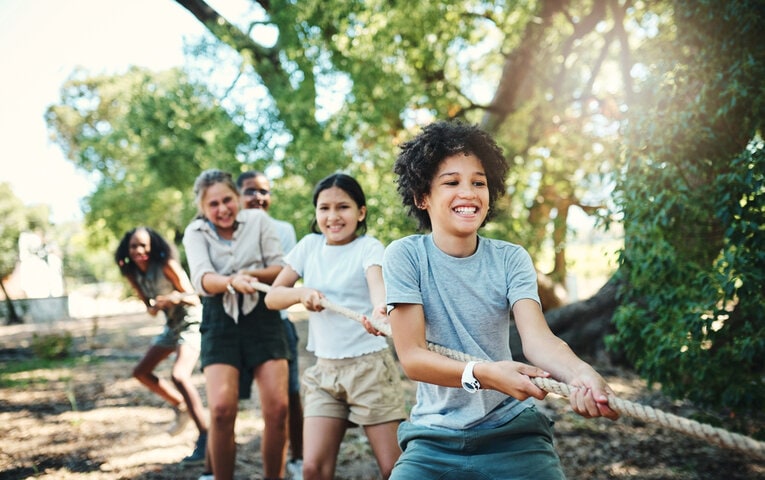Key points
- Norovirus spreads easily at youth camps; require campers to be free of norovirus symptoms upon arrival.
- Make sure that campers, staff, and food workers are trained in food safety practices and good hygiene.
- Isolate ill campers and staff from healthy campers and staff.

Norovirus basics
Norovirus is very contagious and causes vomiting and diarrhea. People of all ages can get infected and sick with norovirus. You can get norovirus from:
- Having direct contact with an infected person, such as shaking hands.
- Sharing food or eating utensils with an infected person.
- Consuming contaminated food or water.
- Touching contaminated surfaces then putting your unwashed hands in your mouth.
Guidance for healthy camping
Promote healthy camping by sharing these norovirus prevention tips with camp staff, parents, and kids.

Before camp
- Establish a pre-camp arrival agreement requiring campers to be free of norovirus symptoms upon arrival; let parents know that they may need to pick up ill campers.
- Tell parents not to drop off ill campers or campers who have been ill in the last 48 hours.
- Instruct staff on how to properly wash their hands; make sure that handwashing facilities have soap, running water, and disposable towels.
During camp
- Instruct campers how to properly wash their hands; make sure that handwashing facilities have soap, running water, and disposable towels.
- Instruct staff and food workers to practice food safety.
- Isolate ill campers and staff appropriately; ensure they use separate restrooms and eating areas until 48 hours after their symptoms resolve.
- Immediately clean then disinfect the entire area after someone vomits or has diarrhea.
- Tell parents ill campers may need to be picked up.
Make sure campers:
1) Wash hands often with soap and water.
2) Do not share food and drinks with others.
3) Practice healthy hygiene.
4) Report any illness to camp staff.
Prevention methods
Follow these more detailed steps to prevent the spread of norovirus at youth camps.
Practice food safety

- Make sure that campers, staff, and food workers are trained in food safety practices, such as using gloves and utensils when handling or preparing ready-to-eat foods, beverages, or ice.
- Do not allow ill campers, staff, or food workers in food service areas until at least 48 hours after their symptoms have resolved.
- Campers, staff, and food workers should not cook with or consume untreated water.
Clean up vomit and diarrhea immediately

- After someone vomits or has diarrhea, always thoroughly clean then disinfect the entire area immediately.
- Put on rubber or disposable gloves, and wipe the entire area with paper towels, soap, and hot water.
- Disinfect the area using a bleach-based household cleaner as directed on the product label.
- If no such disinfectant is available, you can use a solution made with 5 tablespoons to 1.5 cups of household bleach per 1 gallon of water.
- If no such disinfectant is available, you can use a solution made with 5 tablespoons to 1.5 cups of household bleach per 1 gallon of water.
- Leave the bleach disinfectant on the affected area for at least 5 minutes.
- Then clean the entire area again with soap and hot water.
Isolate ill campers and staff

- Isolate ill campers and staff from healthy campers and staff.
- Provide separate restrooms and eating areas until at least 48 hours after ill campers and staff symptoms have resolved.
- Campers and staff who are vomiting or have diarrhea should not swim or participate in recreational water activities until at least 1 week after these symptoms have resolved.
